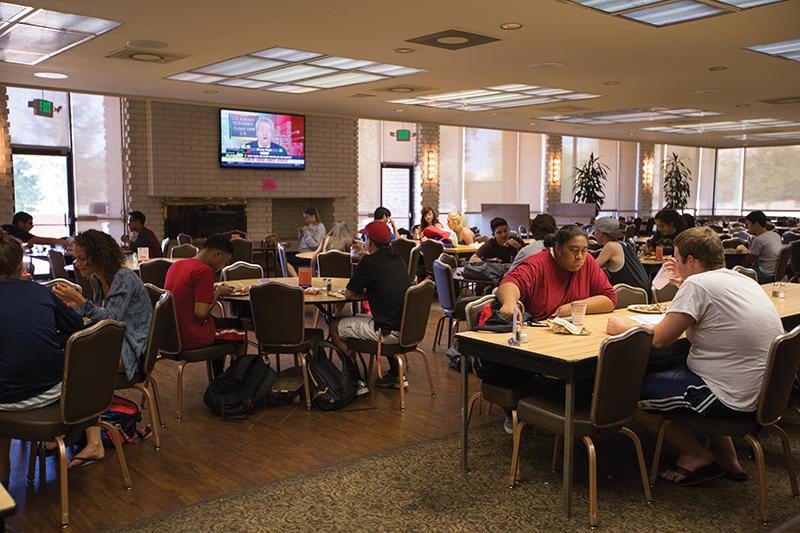
A recent change in the Residential Dining Hall’s offerings at Fresno State stirred up discontent amongst some of its student patrons — many of whom say it’s emblematic of larger issues.
Fresno State’s on-campus dorms, University Courtyard, currently house 1,100 students, all of whom are required to buy a meal plan through the Residential Dining Hall. However, some of those residents have pointed to what they see as major problems concerning the accessibility, cost and menu options provided by the RDH.
“I am concerned for future students who have to endure a limited course of menu options in the same way I have over the past four years,” said Shayan Zoghi, a University Courtyard resident.
Zoghi, a senior biology major who has religious dietary restrictions, has voiced concern about the frequent inclusion of pig-based meats into the main course meals offered at the RDH. He said the dietary options are limited for people of faiths that prohibit them from eating such products.
Even at made-to-order stations, Zoghi reported the denial of his request for meat products not to be included.
Debbie Adishian-Astone, the associate vice president for auxiliary operations that oversees the RDH, said in the past some of the food was premixed at these stations, but that’s no longer the case.
“This has been changed and residents can now customize most of the items offered at these feature stations,” Astone said.
She also noted that there is no way that the vast majority of students are unable to get out of buying a meal plan, as only one student last year and zero students this year have been excluded from the requirement to buy a plan.
“That would be very hard to manage unless there are very strict dietary requirements as determined by a medical professional,” she said.
Michael Wooten’s, a senior business management major and University Courtyard resident, issues with the RDH stem from a perceived lack of nutritional value of the food offerings.
“The food is only good a small percentage of the time, but most of the time it is unhealthy,” he said. “I have gained the most weight in college while living at the dorms, because most of the time the main entrees are junk food.”
Wooten, who is a member of the Bulldog Marching Band, also voiced concerns over the accessibility of the RDH — a concern that he said many band members and athletes across campus have.
“I have been heavily affected by the dining hall hours,” he said. “Whether it is class, band rehearsal or a band performance, I, in some way, have had to find food off campus to eat.”
The RDH is currently open from 7 a.m. to 8 p.m. during weekdays, and 10 a.m. to 8 p.m. during the weekend. These hours are consistent with other California State University campus dining options.
While the RDH does offer sacked dinners as a remedy for students who can’t make it in by 8 p.m., the only time for students to pick up those meals is from 7 a.m. to 10:30 a.m.
Although some customers, such as Wooten, have voiced some objections to the RDH’s practices, they still see it as a necessity for students living in University Courtyard.
“The dorms do not provide reasonable means to cook your own food,” he said. “Each room or suite has a refrigerator, freezer and microwave. Cup of Noodles and Hot Pockets are not my 365 menu of choice.”
With hundreds of students having access to only a small number of kitchens in University Courtyard, if students didn’t have meal plans it would be impossible for all students to cook their own meals, Wooten said.
The RDH is also “exploring modifications” to meal plans that will “provide more value and flexibility” for University Courtyard residents, said Adishian-Astone.
The lowest price meal plan available to all residents is $3,735 per year for 10 meals per week, in addition to allocating students $300 annually to spend toward other campus dining establishments. The highest cost meal plan is $4,029 per year for 19 meals per week. There is also an $2,106 option for 7 meals per week, however it is only available to residents who have lived at University Courtyard for more than one year.
For the cheapest meal plan that first year residents can buy, the 10-flex plan, the average meal at the RDH is $9.92 per meal.
That’s more than a student without a meal plan would have to pay per meal for breakfast, lunch or for Saturday’s or Sunday’s brunch. The only meal that is more expensive for students than the average price of the the 10-flex meal is dinner at $10.25.
Adishian-Astone said that the RDH is considering offering a plan in Fall 2015 which would include “unlimited” meals as well as “an option that includes more flex cash so residents have the option to eat more at other retail dining concepts on campus.”
Another issue facing the RDH is rising operating expenses. According to Adishian-Astone, costs are expected to increase by around $100,000 for the RDH in the 2014-2015 academic year due to increases in the minimum wage, implementation of the Affordable Care Act and higher food costs.
For the past two years the RDH has reported profits of nearly $1 million annually, $956,114 last year and $1,049,795 for 2012-2013.
That money is then put into a reserve that is comprised of the RDH’s and the Kennel Bookstore’s surpluses, and is marked to be reinvested in operations and facilities improvements for the organizations, Adishian-Astone said.
However, rising costs and the expectation of approximately $150,000 less in revenue from commuter meal plans, could leave the RDH with $250,000 less in surpluses annually, Adishian-Astone.






